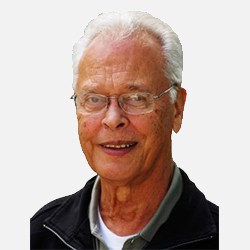The views expressed in our content reflect individual perspectives and do not represent the authoritative views of the Baha'i Faith.
It all begins, according to my understanding, by coming to terms with that magnificent premise, that great hypothesis—the existence of God, the Creator.
Any single avenue of knowing can lead us there. But I think for most it takes a kind of knowing that goes beyond the singular avenue of feeling, reasoning, and longing. A magnificent little book entitled Tacit Knowing, by Michael Polanyi, makes the point that most of what we know is ineffable. In other words, we can know more than we can say or describe.
This ineffable knowing reaches through and embodies every aspect of our being, of who we are—some through their hearts; others through study and logic; a third group through the absorption of tradition and culture; and there are those who are spoken to in dreams, through visions, instincts, and intuition, and through spiritually cataclysmic connections with the Supreme Concourse, as in what happened to Paul on his way to Damascus.
On the ceiling of the Sistine Chapel, Michelangelo painted a picture of God and man reaching towards each other with a small space separating each one’s outstretched fingers.

That magnificent painting symbolizes the dynamics of the unique relationship between God and man, and the inevitable separation brought about by the boundary conditions inherent to the human ontological level, which to some degree can be bridged through an act of faith, the ultimate divine hypothesis, if man chooses to. The Baha’i teachings confirm that separation, and give us a clue about why it exists and what it means to each of us:
Exalted, immeasurably exalted, art Thou above the strivings of mortal man to unravel Thy mystery, to describe Thy glory, or even to hint at the nature of Thine Essence. For whatever such strivings may accomplish, they never can hope to transcend the limitations imposed upon Thy creatures, inasmuch as these efforts are actuated by Thy decree, and are begotten of Thine invention. …
Far, far from Thy glory be what mortal man can affirm of Thee, or attribute unto Thee, or the praise with which he can glorify Thee! Whatever duty Thou hast prescribed unto Thy servants of extolling to the utmost Thy majesty and glory is but a token of Thy grace unto them, that they may be enabled to ascend unto the station conferred upon their own inmost being, the station of the knowledge of their own selves. – Baha’u’llah, Gleanings from the Writings of Baha’u’llah, pp. 3-5.
God, however, requires that we make the first move. After all, it is His creation. Therein lies the hope for humankind:
Love me that I may love thee; if thou lovest me not, My love in no wise can reach thee. Know this O servant. – Baha’u’llah, The Hidden Words, p. 4.
Our choice involves wanting to bridge that gap. To do so we must do it on God’s terms, not our own. By God giving us the potential for reflecting His attributes, a process necessarily involving a choice on our part, He, at the same time, is building within humankind the possibility and the potential to move through the processes of spiritual development towards Him.
We’re each free to view this either as a flaw on God’s part in how He has organized things, or as an incredible gift, an honor bestowed upon humanity.
For God, the Creator, to change His mind and take free will and choice away from us would be a supreme example of negative entropy, i.e., forcing us to act more like a creature of the animal world rather than the level that humans are presently capable of.
Today, most people understand the depth to which man’s choices have wreaked havoc on humankind, not to mention the Earth itself—but few of us recognize the extraordinary triumphs also represented in the progress of humankind so amply recorded throughout history. Admittedly, we still are a bit barbaric, as the veneer of civilization remains pretty thin. However, looking at even the span of recorded history, the general trajectory has been forward, even though it has been cyclical, with two steps forward and one and one-half backwards!
We must look at the past as well as the promising speculations of where we can go, and what we have accomplished. They can both inspire true progress, which is the whole Baha’i message of progressive revelation. In acknowledgement of this fact the famous biologist Julian Huxley has said that the process of physical evolution for the most part has come to an end. Humans, four to five thousand years from now, will likely look very similar to the way we look now. But evolution continues nonetheless—a psychic evolution, an evolution of the mind and of the spirit, of our capacity for consciousness. Because of our innate capacity for cosmic self-awareness, we now are in the enviable position of being able to take charge of the most important work in the universe, namely directing evolution.
This means that we do not have to let horrific trends run their course. Through tapping into God’s plan, revealed in this stage of our human evolution by Baha’u’llah, we now have not only a sense of direction, but we have the Creative Word. Those holy teachings provide the vision, the ideals, the values, the framework, all of which inspire, energize, motivate, and give direction to humankind. An ever-increasing number of individuals are tapping in to that source by immersing themselves in the ocean of the Baha’i teachings, through prayer, through service, all of which represent acts of choice meant to move us in the direction of creating the kind of future we want.
You May Also Like
Comments

















Our testimony is to our powerlessness & poverty. It is His Might & Bounty we are to be as channels for His creation of His future & by which we receive the flow of blessing, love & grace & the certitude of knowing the direction of the evolution of humanity towards cosmically aware one planetary being.